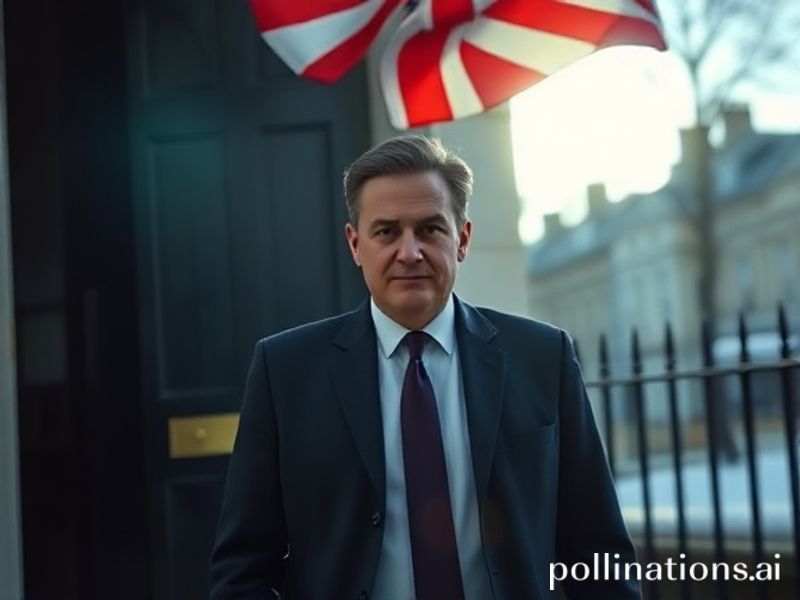Keir Starmer Enters the World Stage: Can Britain’s New PM Out-Boring Global Chaos?
Keir Starmer, the human grey cardigan who now runs the United Kingdom, has suddenly become the most talked-about man in every chancellery, embassy, and WhatsApp group chat from Washington to Warsaw. After fourteen years of Conservative governments that resembled a slow-motion Netflix documentary on aristocratic self-harm, Labour’s victory feels less like a political swing and more like Britain finally admitting the 1970s ended and sobering up before the hangover became fatal.
International observers—those poor souls paid to read British newspapers without giggling—note that Starmer’s ascent lands just as the global order is busy rewriting itself like a Wikipedia entry during an edit war. The United States is limping through an election that may install either an 81-year-old or a 77-year-old who both think TikTok is a clock noise; the European Union is discovering that “strategic autonomy” mostly means buying gas from someone else’s autocrat; and China is politely reminding everyone that the South China Sea is, in fact, China’s kiddie pool now. Into this kindergarten brawl strides Starmer, promising “stability,” a word diplomats whisper like a safe word.
Starmer’s first international audition came at the NATO summit in Washington, where he managed to neither fall off a bike nor declare war on a biscuit. Instead, he offered fresh British troops for Estonia—because nothing says “post-Brexit confidence” like parking your last functioning tanks within earshot of the Russian border—and pledged to raise defense spending to 2.5 % of GDP. The pledge is scheduled for “when fiscal conditions allow,” which is Westminster-speak for “after we find the money tree that Boris sold for firewood.” Still, allies clapped politely; even the French ambassador managed a Gallic shrug of approval, which is practically a standing ovation.
Across the Channel, Brussels is cautiously optimistic. Starmer has junked the Johnson-Truss-Sunak tradition of treating EU negotiations like a stag party in Prague, opting instead for a “reset” that involves not insulting Michel Barnier’s mother. The new foreign secretary, David Lammy, speaks fluent EU jargon—technically a war crime under the Geneva Conventions—and has promised to “deepen” the relationship. Translation: Britain will still refuse freedom of movement, but may stop randomly confiscating German sausages at Dover out of sheer pettiness.
Further afield, the Global South watches with the weary amusement of a bartender listening to a regular swear this time he’ll really quit drinking. Britain’s pledge to return to international development rings hollow when the previous government slashed aid faster than you can say “golden visa.” Starmer’s plan to “rebuild trust” in the Commonwealth mostly involves not sending ministers who confuse Ghana with Guyana, a modest bar that previous administrations still managed to limbo under. Meanwhile, India—now the world’s fifth-largest economy—offers a masterclass in polite revenge, reminding London that the Koh-i-Noor diamond is “comfortable where it is, thank you.”
At home, Starmer faces the delightful riddle of governing a country whose infrastructure was last updated during the premiership of Harold Macmillan and whose electorate expects Scandinavian services at Mississippi tax rates. Internationally, the challenge is grander: convincing partners that Brexit Britain can still be useful without accidentally quoting Churchill at them. Early signs suggest he’ll settle for being the reliable adult in the room—dull, competent, and allergic to headlines. In 2024, that may be the most radical posture of all.
So raise a lukewarm cup of tea to Sir Keir Starmer, the man tasked with proving that Britain can still bestride the world stage without tripping over its own shoelaces. The planet, nursing its own crises, will watch with the detached curiosity of a cat observing someone try to assemble IKEA furniture. Whether he succeeds or merely fails more slowly than his predecessors remains an open question, but at least the international community can enjoy the novelty of a British leader who doesn’t sound like he’s auditioning for a reality show.







